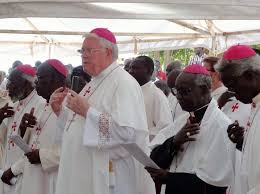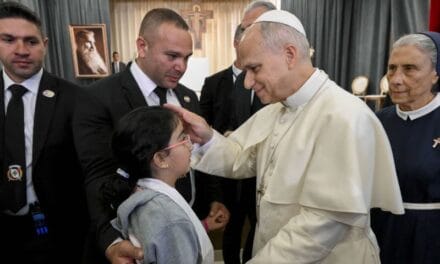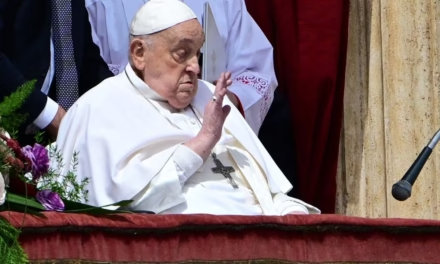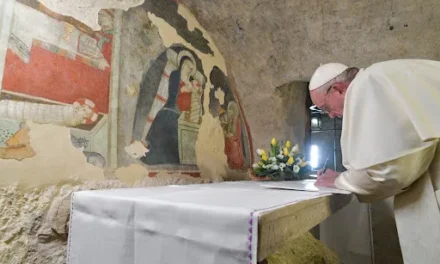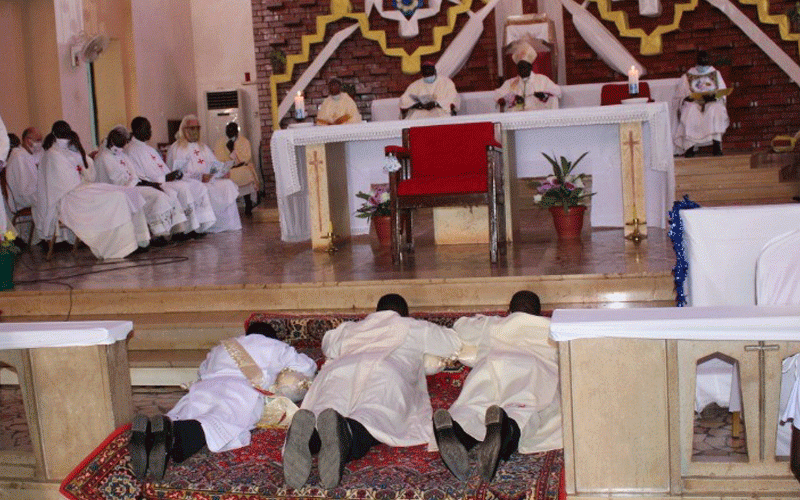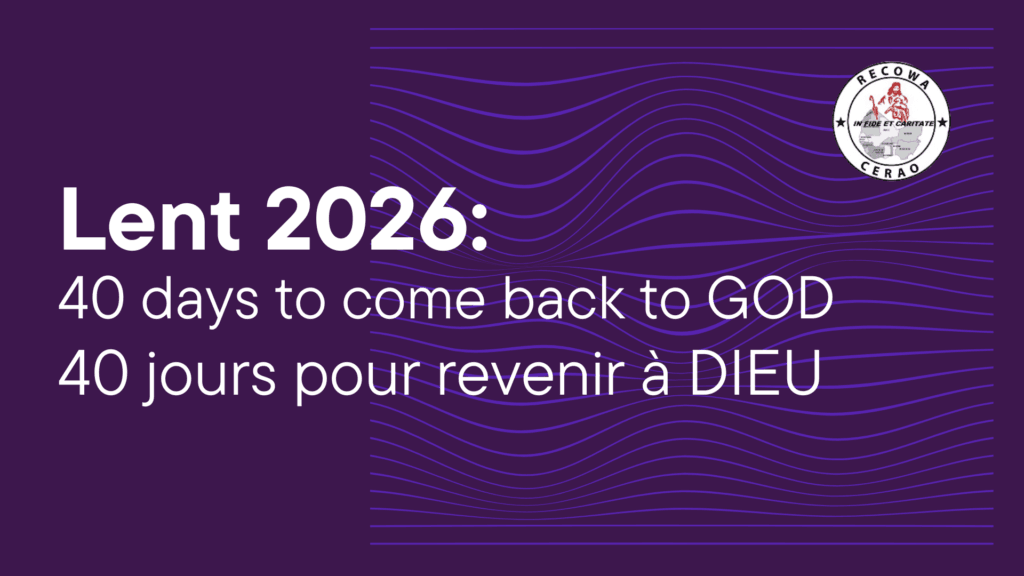«Je pense que la question d’un référendum pour résoudre la question des États est une bonne solution. Laissons notre peuple décider », a déclaré Mgr Stephen Ameyu du diocèse de Torit au Soudan du Sud à ACI Africa dans une interview lundi 9 décembre.
Mgr Ameyu a ajouté en référence au référendum proposé: «Pour moi, je serais d’accord avec cela; allons-y pour un référendum. »
Le ministre sud-soudanais des Affaires du Cabinet, Martin Elia Lomoro, aurait déclaré vendredi à des journalistes à Juba que, tandis que le vice-président désigné Riek Machar est favorable au retour à une structure gouvernementale à 10 États, le président Salva Kiir « et un groupe du parti de l’opposition soutenir les 32 États sur le terrain car leur dissolution entraînera des crises ou une insécurité qui démantèlera la stabilité du pays et la mise en œuvre du processus de paix. »
Considérant ce manque de consensus sur le nombre d’États et leurs frontières respectives et étant l’un des problèmes majeurs en suspens qui ont provoqué la deuxième extension de la formation d’un gouvernement d’unité aux côtés des arrangements de sécurité, Lomoro a déclaré qu’un vote référendaire serait utilisé pour résoudre l’impasse. .
Le dernier soutien de Mgr Ameyu au référendum est conforme à sa proposition antérieure faite dans une interview exclusive avec ACI Africa.
«Cette question de 10 États, 28 États ou 32 États (peut) être résolue par le peuple, par référendum, afin que nous puissions la régler une fois pour toutes – que les gens ont besoin de 32, ils ont besoin de 28 ou ils en ont besoin de 10, que est la seule solution pour nous dans ce pays », a déclaré Mgr Ameyu à ACI Africa dans l’interview de novembre.
Au cours de l’entretien du 9 décembre, le prélat sud-soudanais a proposé que les parties conviennent de résoudre toutes les autres questions litigieuses, y compris les dispositions de sécurité, puis de former le gouvernement d’unité et que «la question du nombre d’États soit réglée avant les élections générales».
En avril 2015, le Parlement du Soudan du Sud a voté pour modifier la constitution transitoire de 2011 prorogeant les mandats présidentiel et parlementaire jusqu’au 9 juillet 2018. Le mandat de l’exécutif et du législatif du pays a été, en juillet 2018, prolongé jusqu’en 2021.
Selon Mgr Ameyu, «les options du référendum devraient être de 3 options: 10 États, 32 États ou le système de district britannique.»
Il a exprimé sa préférence pour la structure du gouvernement du district, qu’il considère comme une consolidation des principales régions du pays, à savoir Bhar el Ghazal, le Haut-Nil et l’Équatoria.
«Allons-y pour les districts, même notre voisin l’Ouganda est (gouverné) dans des districts», a déclaré l’évêque sud-soudanais, ajoutant: «Je pense que cela pourrait ramener le cœur du peuple».
Pendant ce temps, Mgr Stephen Nyodho, du diocèse de Malakal au Soudan du Sud, a exprimé des réserves sur un référendum proposé sur l’état des choses dans sa vaste juridiction ecclésiastique.
«En appelant à un référendum, qui va voter pour le référendum? Les gens de Juba? »L’évêque Nyodho a sondé et expliqué:« Lorsque la moitié de la population du Soudan du Sud sont des déplacés internes (PDI), certains sont des réfugiés à l’extérieur, comment allons-nous amener ces personnes? Vont-ils voter dans les camps de réfugiés? »
L’évêque Nyodho a exprimé sa préférence pour une solution amiable entre les parties au conflit en disant: «La situation a déjà été créée, beaucoup de gens peuvent souhaiter que 32 États restent et d’autres ne reconnaissent pas 32 États, il appartient au gouvernement de prendre courage et décider de ce qui pourrait être vraiment bon pour le peuple du Soudan du Sud. »
L’évêque Nyodho a souligné en référence à la controverse autour du nombre d’États et de leurs frontières, «Les deux parties devraient s’asseoir et parvenir à un accord en tant que citoyens d’un pays.»
xxxxxxxxxxxxxxxxxxxxxxxxx FROM THE COMMUNICATIONS OFFICE OF RECOWA-CERAO
Weeks after a South Sudanese Bishop recommended that the controversy around boundaries and the number of states in his country be resolved through engaging citizens in a poll, the Government of the world’s youngest nation announced Friday, December 6 that the divisive issue of states will require a referendum a move the Bishop has once again welcomed.
“I think the question of going for a referendum to solve the question of states is a good solution. Let our people decide,” Bishop Stephen Ameyu of South Sudan’s Torit diocese told ACI Africa in an interview Monday, December 9.
Bishop Ameyu added in reference to the proposed referendum, “For me, I would stand for that; let us go for a referendum.”
South Sudan’s Minister of Cabinet Affairs, Martin Elia Lomoro has been quoted as telling journalists in Juba on Friday that while the vice-president designate Riek Machar favors reverting to a 10-state government structure, President Salva Kiir “and one group of the opposition umbrella support the 32 states on the ground that dissolving them will cause crises or insecurity that will dismantle the stability of the country and implementation of the peace process.”
Considering this lack of consensus about the number of states and their respective boundaries and being one of the critical outstanding issues that caused the second extension of the formation of a unity government alongside security arrangements, Lomoro said a referendum vote would be used to resolve the stalemate.
Bishop Ameyu’s latest support for the referendum is consistent with his earlier proposal made in an exclusive interview with ACI Africa.
“This question of 10 states, 28 states or 32 states (can) be resolved by the people, by a referendum, so that we can settle it once and for all – that people need 32, they need 28 or they need 10, that is the only solution for us in this country,” Bishop Ameyu told ACI Africa in the November interview.
During the December 9 interview, the South Sudanese Prelate proposed that the parties agree on resolving all other contentious issues including security arrangements and then form the unity government and that “the question of states’ number be done before the general election.”
In April 2015, the South Sudan parliament voted to amend the 2011 transitional constitution extending the presidential and parliamentary term to July 9, 2018. The term for the country’s executive and the legislature was, in July 2018, extended to 2021.
In Bishop Ameyu’s opinion, “The options of the referendum should be 3 options: 10 states, 32 states or British district system.”
He expressed a preference for the district government structure, which he sees as a consolidation of the country’s major regions of Bhar el Ghazal, Upper Nile, and Equatoria.
“Let us go for the Districts, even our neighbor Uganda is (governed) in districts,” the South Sudanese Bishop said and added, “I think that may bring back the hearts of the people.”
Meanwhile, Bishop Stephen Nyodho of South Sudan’s Malakal Diocese has expressed reservations over a proposed referendum considering the state of things in his vast Church jurisdiction.
“By calling for a referendum, who are going to vote for the referendum? People of Juba?” Bishop Nyodho probed and explained, “When the half of the people of South Sudan are IDPs (Internally Displaced Persons), some are refugees outside, how are we going to bring these people? Are they going to vote in refugee camps?”
Bishop Nyodho expressed preference for an amicable solution between the parties in conflict saying, “The situation has already been created, many people may like 32 states to stay and others don’t recognize 32 states, it is the responsibility of the government to take courage and decide what could be really good for the people of South Sudan.”
Bishop Nyodho emphasized in reference to the controversy around the number of states and their boundaries, “The two parties should sit down and come to an agreement as citizens of one country.”
- CATHOLIC ARCHBISHOP IN GHANA HAILS POPE LEO XIV AS GOD’S GIFT - 23 mai 2025
- POPE LEO XIV TO APPROVE CANONIZATIONS - 22 mai 2025
- THE EVOLUTION OF PAPAL TRANSPORTATION - 20 mai 2025

